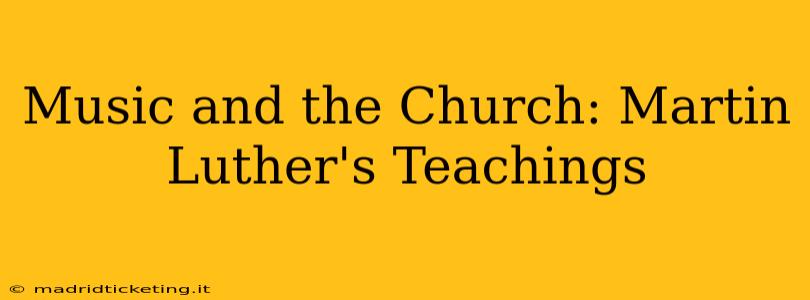Martin Luther, the seminal figure of the Protestant Reformation, held profound views on the role of music within the church. His impact on church music wasn't merely a shift in style; it was a theological revolution, reshaping the very purpose and practice of congregational singing. This article delves into Luther's teachings on music, exploring his beliefs and their lasting legacy on Protestant worship.
Why Did Luther Believe Music Was Important in Worship?
Luther believed deeply in the power of music to enhance spiritual experience. He saw music not just as entertainment but as a vital tool for proclaiming God's word and fostering faith. He argued that music could move the heart and mind in ways that mere words could not, making it an indispensable element of Christian worship. His conviction stemmed from his understanding of scripture, viewing music as a gift from God designed to glorify Him and uplift the human spirit. This wasn't merely a personal preference; it was a theological conviction deeply rooted in his understanding of the nature of God and the human response to divine grace.
How Did Luther's Views Differ From the Catholic Church's?
Luther's views on church music contrasted sharply with those of the Catholic Church during his time. The Catholic Church, with its elaborate liturgical music and focus on the Latin Mass, often emphasized the role of trained clergy and choirs, leaving the congregation largely passive participants. Luther, in contrast, championed congregational singing, believing that all believers, regardless of musical skill, should actively participate in worship through song. This democratization of music within the church was a significant departure from established practice and reflected his broader emphasis on the priesthood of all believers. He believed that singing hymns was a powerful means of expressing faith, fostering community, and memorizing scripture.
What Role Did Hymns Play in Luther's Theology?
The rise of the hymn, as we know it, is largely attributable to Luther. He didn't just advocate for congregational singing; he actively wrote and translated hymns, making them accessible to the common person in their vernacular language (German). These hymns, often simple and melodic, were intended to express core theological truths in a way that was easily understood and remembered. They were not merely musical additions to worship; they were integral to the very fabric of Luther's reformed theology, communicating doctrine, encouraging prayer, and fostering a sense of communal devotion. Famous examples such as "A Mighty Fortress Is Our God" cemented the hymn's importance as a powerful tool for evangelism and spiritual edification.
What are some of Luther's most famous hymns?
Several of Luther's hymns continue to be sung in churches around the world, both Protestant and beyond. "A Mighty Fortress Is Our God" is arguably the most famous, a powerful anthem reflecting both spiritual strength and courage. Others include "From Heaven Above to Earth I Come," "Now Thank We All Our God," and "Christ the Lord Is Risen Today." These hymns are not just musical pieces but testaments to Luther's theological vision, reflecting core themes of faith, salvation, and God's grace.
What is the significance of the chorale in Lutheran worship?
The chorale, a simple, harmonized hymn, became a cornerstone of Lutheran worship. This focus on congregational singing, facilitated by easily learnable melodies and clear texts, reflected Luther’s belief in the active participation of all believers in worship. The chorale was not simply a musical embellishment but a means of expressing faith and engaging directly with scripture through music. Its lasting influence is evident in Lutheran churches worldwide.
How Did Luther's Teaching on Music Impact the Development of Protestant Music?
Luther's legacy on Protestant church music is undeniable. His emphasis on congregational singing, vernacular hymns, and the use of music as a means of teaching and fostering faith profoundly shaped the musical landscape of Protestant churches. The simplicity and accessibility of the chorale directly influenced hymnody throughout the Protestant world, leading to a rich tradition of congregational song that continues to this day. His influence extended far beyond the Lutheran church; the emphasis on congregational participation and the use of music as a tool for theological expression profoundly affected many other Protestant denominations.
Conclusion
Martin Luther's teachings on music were not merely musical preferences; they were integral to his theological vision. His emphasis on congregational singing, vernacular hymns, and the use of music as a means of theological expression irrevocably altered the course of Protestant church music and continues to resonate in worship practices across the globe. His legacy serves as a powerful reminder of music's capacity to strengthen faith, foster community, and proclaim God's word.

